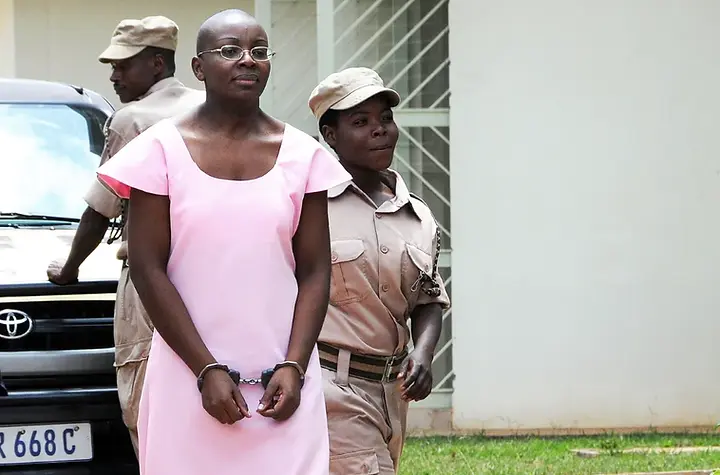Heading 2
Heading 2
Heading 2

Rwandan opposition leader, Victoire Ingabire, is led to the Rwandan High Court as the fourth week of her trial begins in Kigali, Rwanda, September 12, 2011.photo Getty image
Victoire Umuhoza: From Exile to Resisting Dictatorship in Rwanda
Victoire Umuhoza returns from exile to challenge Kagame. Her 2010 arrest, long prison years & continued harassment show the cost of resisting dictatorship.
8/15/25, 5:24 AM
On a bright morning in January 2010, a small RwandAir jet landed at Kigali airport. Among the passengers was Victoire Ingabire Umuhoza, a 41‑year‑old Rwandan mother who had lived in the Netherlands for 16 years. She clutched papers showing the registration of her political party and a roadmap for national reconciliation. Photographers snapped her arrival. She knew that returning to Rwanda, still under the control of President Paul Kagame, meant risking her freedom, but she felt compelled to act. In a first‑person article for Al Jazeera, she later wrote that she said goodbye to her husband and children in the Netherlands and flew home because she believed “Rwandans deserve to live free, without fear.”
After landing, Victoire headed to the Kigali Genocide Memorial. With TV cameras rolling, she laid flowers and spoke of the need to honour all victims, Tutsi, Hutu, and others, and to build a peaceful future. Within hours, pro‑government media accused her of “genocide denial.” Her speech would later become evidence used to convict her.
Chapter 1: From childhood to exile - building a political voice
Victoire Ingabire was born in Rwanda in 1968 and grew up under President Habyarimana. When the presidential plane was shot down in April 1994, she was studying business management and economics in the Netherlands. The genocide and civil war that followed devastated her homeland and led to a new Rwandan Patriotic Front government under Paul Kagame. For safety, she remained abroad.
In the Netherlands, Victoire pursued further studies and worked in finance. Instead of fading into private life, she joined Rwandan exile politics. In 1998, she joined the Republican Rally for Democracy in Rwanda (RDR), a diaspora party advocating for democracy and refugees’ rights. Two years later, at a congress in Bonn, she was elected president of the RDR. In 2006, the RDR merged with other movements to form the Forces Démocratiques Unifiées (FDU–Inkingi).
The FDU announced plans to contest the 2010 presidential elections, with Victoire as its candidate. She spent years lobbying international organisations and European governments about Rwanda’s human rights record.
Despite living comfortably in Europe, Victoire remained connected to the Democratic Republic of Congo (DRC) and the Great Lakes region. Friends say she supported dialogues for peace in Congo and criticised Rwanda’s military interventions. Her activism coincided with growing international awareness of Kigali’s support for rebel groups such as the M23, which have fuelled conflict and plundered Congolese minerals. This pro‑Congo stance, while not a crime, placed her at odds with Kigali’s regional ambitions.
Chapter 2: Decision to return — challenging Kagame’s hegemony
By 2009, it was clear that Rwanda’s political space was tightly controlled. Opposition parties were denied registration, and journalists were jailed. Human Rights Watch (HRW) reported that opposition leader Bernard Ntaganda faced prosecution for “genocide ideology” while his PS‑Imberakuri party struggled to register.
Victoire nonetheless decided to return. Her son Rémy Amahirwa later wrote in The Guardian that their family enjoyed a stable life in the Netherlands, but she could not silently watch from Europe as Rwandans lost their freedoms. She wanted to challenge Kagame in the August 2010 election.
Victoire arrived in January 2010 and immediately faced an intense campaign of vilification. HRW noted that she was widely condemned in official media as a “negationist” of the genocide for stating that crimes committed against Hutu civilians should also be investigated. On February 3, local officials lured her and FDU colleague Joseph Ntawangundi to a government office; a mob attacked them, stealing her passport and shouting, “We don’t want people with genocide ideology!”. Government supporters labelled her and fellow opponents as “génocidaires” to delegitimize their participation. On April 21, she was summoned and placed under house arrest.
On October 14, 2010, authorities arrested her again and charged her with terrorism, conspiracy to undermine the established government, propagation of genocide ideology, and sectarianism. These charges were based partly on testimony from former rebels who had been detained and allegedly coerced into accusing her. Amnesty International observed that the laws on “genocide ideology” and “sectarianism” are vague and have been misused to suppress political dissent, noting that even children could be punished under them. Human rights groups said the prosecution’s evidence was weak and that the trial aimed to bar her from the election.
Chapter 3: Inside the regime’s courtroom — weaponizing genocide laws
Victoire’s trial began in 2011. Government officials publicly called her guilty before the court delivered a verdict, undermining the presumption of innocence. HRW described the trial as politically motivated and flawed; witness intimidation and procedural irregularities were reported. On October 30, 2012, the High Court in Kigali found her guilty of conspiracy to undermine the government and of denying the genocide, sentencing her to eight years in prison. The court acquitted her of more serious terrorism charges, yet prosecutors later appealed.
In December 2013, the Supreme Court increased her sentence to 15 years. Judges upheld the conviction for “genocide denial” based on her remarks at the genocide memorial. Legal scholars pointed out that the court misinterpreted her call for recognition of all victims as a denial. In 2017, the African Court on Human and Peoples’ Rights ruled that Rwanda had violated Victoire’s rights to freedom of expression and a fair trial. The court noted that her statements at the memorial did not incite hatred and that criminalizing such expression discouraged public debate. It ordered Rwanda to release her and expunge the conviction. Kigali ignored the ruling.
Chapter 4: Prison years — survival and silent resistance
For the next eight years, Victoire was held at Kigali Central Prison and later Mageragere. Reports indicate she spent five years in solitary confinement. She refused to sign false confession or apology letters and maintained that she had committed no crime. In July 2015, activists wrote an open letter to the prison director describing how officials tightened her confinement regime, denying her lawyer visits and confiscating her books and hymn book. The letter called this treatment “mental torture.”
Prison was harsh. Fellow detainees told human rights organisations that Rwandan prisons use coffin‑like cells, beatings, and forced confessions, sometimes at unofficial detention centres like Kwa Gacinya. In these facilities, detainees are submerged in dirty water tanks and beaten; at least eleven prisoners died from such abuse. While there is no public record of Victoire being physically tortured, she endured prolonged isolation and constant pressure to repent. Supporters say she organised debates among inmates about Rwanda’s history and smuggled letters urging peaceful resistance, but such acts remain anecdotal and difficult to verify.
Despite the difficulties, Victoire’s presence in prison inspired others. Her popularity grew as many Rwandans saw her as the symbol of an alternative future. Her supporters created the Victoire Ingabire Foundation to campaign for her release and provide legal support. In 2014, she was nominated for international awards recognising her courage.
Chapter 5: Release, hope, and renewed persecution
In September 2018, Kagame granted a presidential pardon to Victoire and over 2,000 other prisoners. Al Jazeera reported that she had been serving a 15‑year sentence for genocide denial and conspiracy and was freed alongside journalists and opposition figures. Upon leaving Nyarugenge prison, she thanked the president for her release but insisted that other political prisoners should also be freed. However, the pardon did not clear her criminal record. The New York City Bar Association noted that she must report monthly to a prosecutor, request permission to travel, and cannot reunite with her family abroad.
Victoire’s son confirmed in 2025 that she still could not visit her husband in Europe, who is paralysed and gravely ill. He wrote that she missed graduations, weddings, and the birth of her grandchildren. The conditions of her pardon were set to expire in October 2025, but hopes were dashed when Rwandan police arrested her again on June 19, 2025. Reuters reported that authorities accused her of inciting public disorder and creating a criminal organisation. Her lawyer said the charges were politically motivated. She remains detained awaiting trial.
Victoire formed a new party, Development and Liberty for All (DALFA‑Umurinzi), in November 2019 after the government refused to register FDU. HRW noted that several members of FDU/DALFA have been detained, tortured, or disappeared. In March 2019, her assistant Anselme Mutuyimana was found strangled in a forest. Other colleagues, including party coordinator Syldio Dusabumuremyi, were killed in 2019, and members Boniface Twagirimana and Venant Abayisenga have disappeared. These incidents underscore the dangers facing opposition activists in Rwanda.
Chapter 6: International recognition vs. local persecution
While she endured prison and harassment at home, Victoire’s defiance attracted global admiration. In 2024, the international liberal movement Liberal International awarded her its Prize for Freedom. The organisation praised her for fighting for democracy and human rights, noting that she had been imprisoned through politically motivated proceedings and served eight years of a 15‑year sentence before being released. It stressed that she remained at risk of persecution after forming a new opposition party. This recognition highlights the paradox: abroad, she is celebrated as a champion of democracy, while at home she is treated as a criminal.
Human rights groups continue to call for her release. In 2025, the New York City Bar Association urged Rwanda to restore her rights and condemned the government’s failure to comply with the African Court’s ruling. The Guardian opinion piece by her son emphasised the broader context: Rwanda presents itself as a development success story, yet behind the “Visit Rwanda” tourism campaign lies a dark record of arrests, disappearances, and killings. He urged democratic governments to condition aid on respect for human rights
Chapter 7: Congo, minerals, and the regional dimension
Victoire’s story cannot be separated from the wider politics of the Great Lakes. As Rwanda’s government projects an image of order and progress, it has also been accused by the United Nations of supporting armed groups in eastern DRC. In July 2024, UN experts reported that 3,000-4,000 Rwandan soldiers fought alongside M23 rebels, giving Rwanda “de facto control” over M23.
They also found that children as young as 12 were recruited from Rwandan refugee camps and trained by M23 and Rwandan soldiers. Other reports show that M23 and allied militias exploit coltan and cassiterite mines, smuggling the minerals through Rwanda to global markets. The U.S. Treasury and UN Group of Experts have sanctioned militia networks linked to Kagame’s government for conflict minerals smuggling, forced labour, and executions, as detailed in our previous investigation.
Victoire often spoke about these regional issues. She has urged Rwandans to oppose violence and called on international partners to stop supporting armed groups. Her return to Rwanda coincided with her criticism of Kagame’s cross‑border interventions. In doing so, she challenged not only domestic authoritarianism but also Kigali’s regional agenda.
Closing: A living symbol of resistance
After more than a decade of persecution, Victoire Ingabire Umuhoza remains a powerful symbol of peaceful resistance. She risked her life and family for a dream of a democratic Rwanda. Her 2010 return, trial, prison years, release, and re‑arrest illustrate a pattern of repression. Her case shows how Rwanda’s leadership uses vague genocide ideology laws to criminalise dissent, how courts are manipulated to silence opponents, and how forgiveness is conditional on submission
Yet Victoire’s resilience inspires many across Africa. She embodies the belief that a single person’s courage can spark change. Her journey also underscores the importance of solidarity between Congolese and Rwandan democrats: both peoples suffer from the same authoritarian system that fuels conflict in the DRC and repression at home. As long as Victoire remains behind bars or under surveillance, Rwanda cannot claim to be a free society. The world must not look away.
Keep Reading





















